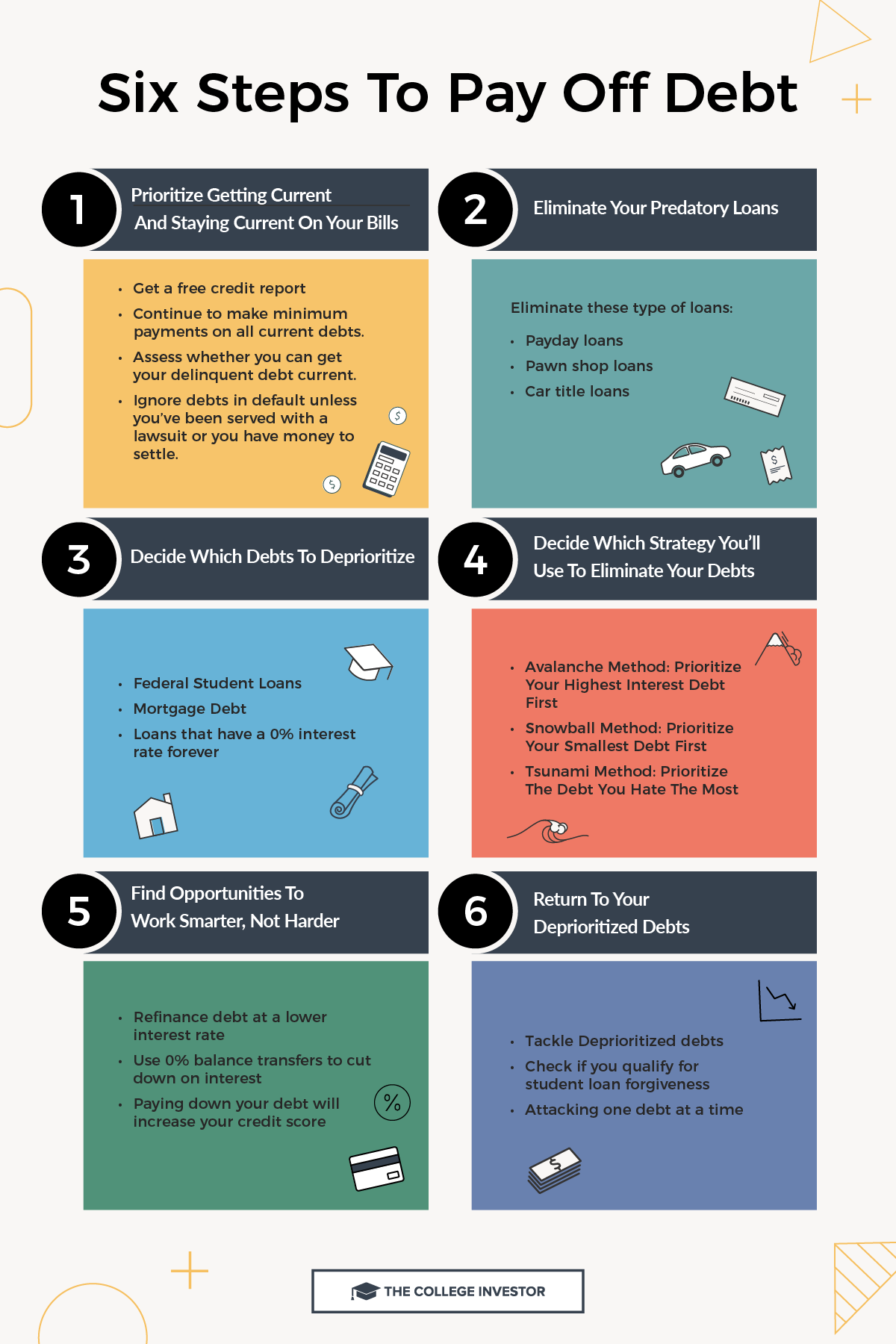If you’re looking to get your personal finances in order and pay off debt, knowing where to start can be a real challenge – especially when it comes to figuring out which loans to pay off first. You might be feeling some paralysis by analysis when deciding which debt to pay off first.
This step-by-step guide will help you figure out where to start, how to keep going, and how to personalize the debt payoff journey to suit your needs. Our guide assumes that you've already have a basic budgeting system in place and now you just need a strategy to pay down your debt.

Step 1: Get Current On Your Bills
Before talking about the various types of debt you may have to pay off including medical debts, credit cards, and student loans, it’s critical to prioritize your current, delinquent, and defaulted debts.
-
Current debts are any debts where you owe money, and you’re making on-time payments every month.
-
Delinquent debts are debts where you are behind on payments, but the bill is not yet in collections.
-
Defaulted debts are debts in collections. You'll know a debt is in default if a collection agency is hounding you to get you to collect payment.
Not sure whether your debts are current, delinquent, or in default? A free credit report can help you figure out all that information.
When it comes to paying off debt, your top priorities should be to continue making minimum payments on all current debts. Paying your bills on time each month will help you to build a good credit score. You don’t want to damage your credit score by letting one of these bills fall into delinquency.
Then, if you have delinquent debts, can you make them current? This depends on your savings and whether you have the money to pay off this debt. Rehabilitating a loan is better for your credit than letting it slide into default.
If you think that you may end up defaulting on a debt or two, consider doing it strategically, by seeking free advice from a low-cost financial attorney or a certified credit counselor first.
Once you’ve defaulted on a debt, it can’t do any more damage to your credit than it’s already done. Collections agencies may be hounding you, but you can get them to stop. Unless you’ve been served with a lawsuit or you have the money to settle an old loan, you don’t want to deal with collections agencies. Let these loans in default wait while you get the rest of your financial house in order.
If you’ve fallen behind on debt payments, getting them current can be tricky. But if you have a full-time job and are willing to trim lifestyle expenses to the bare bones, you probably can get most or all of your bills current.
Once your bills are current, you can start the phase of debt payoff and figure out which debt to tackle first.
Step 2: Eliminate Your Predatory Loans
Predatory loans are loans that have an interest rate above the legally established usury rates, (which may hover around 39.5% in some states). Usury rates refers to a rate of interest considered to be excessive compared to market interest rates.
Some lenders get around usury laws by charging obscene “renewal” fees for short-term loans. For example, title loan companies can charge more than 100% annually. They do this by re-issuing their loans each month until a borrower defaults (and loses their car) or manages to pay off the loan. Payday loans have even higher interest rates.
Payday loans, pawn shop loans, and car title loans are loans issued by lenders who are happy to issue “technically legal” loans while ruining borrowers' lives.
If you have a predatory loan, get that loan out of your life as quickly as possible. The fees are so high it will hinder your ability to pay off any debt in a relatively quick manner.
Step 3: Decide Which Debts To Deprioritize
Although it’s tempting to include every type of debt in your preferred debt payoff plan, there are a few to save for the end. This is because they offer unique benefits to borrowers. Consider “deprioritizing” debt payoff on these types of loans. This means you're going to address them – but maybe in a different way (via loan forgiveness), or at a different time (due to interest rate or other factors).
- Federal Student Loans. These loans offer income-driven repayment plans among other benefits. Even if you don’t qualify for Public Service Loan Forgiveness, you may qualify for other types of Federal loan forgiveness programs. Once your other debts are finished, feel free to aggressively attack your Federal loans if you're not getting them forgiven. But don’t attack these until your other debts are eliminated and only if it makes sense to do so (never pass up free money).
- Mortgage Debt. If you have a mortgage you may qualify to itemize deductions and reduce your tax bill. Even with current mortgage rates above 5% annually, you may not want to rush to eliminate this debt until all your other debts are cleared.
- Loans that have a 0% interest rate indefinitely. If you negotiated a payment plan with a hospital or dentist, you probably have a 0% interest rate on this debt. The rate won’t go up, and paying off the bill early won’t boost your credit score. Continue to make the minimum payments on this until you’ve paid off everything else.
Step 4: Decide Which Debt-Elimination Strategy To Use
After your worst debt is in the rearview mirror, pick a debt payoff strategy to help you decide what to pay first.
An effective debt payoff strategy recommends you eliminate one debt at a time so you can see your progress. Every debt you pay off frees up more of your cash to eliminate the next one.
Avalanche Method: Prioritize Your Highest Interest Debt First
In the avalanche method of debt payoff, you make minimum payments on every debt except your highest-interest debt.
Every extra dollar you put towards debt (beyond minimum payments) will go towards paying off your debt with the highest interest rate. Once that debt is eliminated all the money that was going towards the eliminated debt goes to the debt with the next highest interest rate.
In the example below, the credit card with the 22% interest rate is paid off before any other debt. The borrower then pays the private student loan, the personal loan, and finally, the car loan. The federal student loan and mortgage are deprioritized because their interest is lower and they’re considered to be “good debts.”
|
Debt |
Amount |
Interest |
Order Of Payoff |
|---|---|---|---|
|
Credit Card 1 |
$9,872 |
22% |
1 |
|
Private Student Loan |
$6,420 |
9% |
2 |
|
Personal Loan |
$1,872 |
7% |
3 |
|
Car Loan |
$32,987 |
6% |
4 |
|
Federal Student Loan |
$19,271 |
6.5% |
Deprioritized |
|
Mortgage |
$239,192 |
3.5% |
Deprioritized |
Snowball Method: Prioritize Your Smallest Debt First
The snowball method is all about getting quick wins to keep you motivated. In the snowball method, you’ll pay off the debt with the smallest balance first. This way, you may be able to pay it off in just a few months and feel invigorated to pay off the next.
In the example below, the borrower first pays off the personal loan with a $1,872 balance even though she has higher interest debts. This method isn’t as favorable mathematically, but it tends to work well with human psychology. It’s especially effective if you have a bunch of tiny debts that just need to be cleaned up forever.
|
Debt |
Amount |
Interest |
Order Of Payoff |
|---|---|---|---|
|
Personal Loan |
$1,872 |
7% |
1 |
|
Private Student Loan |
$6,420 |
9% |
2 |
|
Credit Card 1 |
$9,872 |
22% |
3 |
|
Car Loan |
$32,987 |
6% |
4 |
|
Federal Student Loan |
$19,271 |
6.5% |
Deprioritized |
|
Mortgage |
$239,192 |
3.5% |
Deprioritized |
Tsunami Method: Prioritize The Debt You Hate The Most
The Debt Tsunami method harnesses your emotional energy to help you destroy debt. In this method, you prioritize the debt that you loathe the most. If the overdue child support that you owe to your ex causes you to lose sleep, get rid of it first.
Not feeling as much hatred for racking up your credit card for the trip to Bali with your sisters? Save it for later.
The Debt Tsunami payoff method is designed to give you more emotional freedom as you gain financial freedom as well. If you have some emotional baggage around your debt, this could be a great option for you.
In the example below, the personal loan for a wedding ring associated with a broken engagement is paid off first followed by credit card purchases, the new car loan, and finally the private student loan.
|
Debt |
Amount |
Interest |
Order Of Payoff |
|---|---|---|---|
|
Personal Loan for Wedding Ring For Broken Engagement |
$1,872 |
7% |
1 |
|
Credit Card Purchases You Made When You Knew You Shouldn't |
$9,872 |
22% |
2 |
|
Car Loan For New Car You Didn't Need |
$32,987 |
6% |
3 |
|
Private Student Loans For Amazing Study Abroad Experience |
$32,987 |
9% |
4 |
|
Federal Student Loan |
$19,271 |
6.5% |
Deprioritized |
|
Mortgage |
$239,192 |
3.5% |
Deprioritized |
Step 5: Find Opportunities To Work Smarter, Not Harder
When you first start paying down debt, you may not have many opportunities to refinance debt at a lower interest rate or use 0% balance transfers to cut down on the interest you’ll pay.
But as you pay down debt, your credit score is likely to rise, and more opportunities will open up. Once you’ve started to develop your debt payoff muscles, taking advantage of these opportunities can help you work smarter.
Your first plan doesn’t need to be your only plan when you’re paying off debt. Combine new tactics with your strategy to develop an even better way to get out of debt faster.
Step 6: Pay Down Your Deprioritized Debts
Get rid of the final remaining debt you have—most likely your student loan debt. Check to see if you qualify for loan forgiveness or alternative paths to forgiveness. Then, create a plan to attack one debt at a time.
For student loans specifically, there are a lot of repayment plans that might make more financial sense than simply aggressively throwing money at them. Even though your goal is to become debt-free, you don't want to waste money in the process.
With enough determination and focus, you can motivate yourself to eliminate large debts and achieve greater levels of financial freedom.
The post Which Debt To Pay Off First? [Order Of Operations] appeared first on The College Investor.

![Which Debt To Pay Off First? [Order Of Operations]](https://moneyvisa.com/wp-content/uploads/2025/08/Which-Debt-To-Pay-Off-First-Order-Of-Operations.png)











